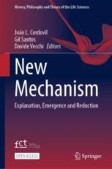Search
Search Results
-
Morality as Cognitive Scaffolding in the Nucleus of the Mesoamerican Cosmovision
The aim of this chapter is to investigate changes and continuities of human moral systems from an evolutionary and socio-historical perspective....
-
Intuitionistic Modal Algebras
Recent research on algebraic models of quasi-Nelson logic has brought new attention to a number of classes of algebras which result from enriching...
-
Physiological Notes: II. Contributions to the Theory of the Cell. a) Energids and Cells
The concept of the energid (which refers to “energy,” or “vital force”; in modern terms, adenosine triphosphate, ATP) is that the smallest unity of...
-
Insurrectionist Ethics Radical Perspectives on Social Justice
'Insurrectionist Ethics' is the name given to denote the myriad forms of justification for radical social transformation in the interest of freedom...
-
Substructural Nuclear (Image-Based) Logics and Operational Kripke-Style Semantics
This paper deals with substructural nuclear (image-based) logics and their algebraic and Kripke-style semantics. More precisely, we first introduce a...
-
Animal Cloning: Scientific Endeavour, Perception and Ethical Debate
In 1996, a single lamb born (Dolly) from an experiment involving 277 embryo reconstructions that developed into 29 early in vitro embryos that were...
-
Revisiting Julius Sachs’s “Physiological Notes: II. Contributions to the Theory of the Cell. a) Energids and Cells” (1892)
Julius Sachs (1832–1897), who has been quite rightly called “the father of plant physiology,” was a German physiologist of international standing,...

-
Reductionism and Holism
The introductory chapter is devoted to the debate between the proponents of the reductionist and holistic conceptions, presenting exemplars employed...
-
Race and indigeneity in human microbiome science: microbiomisation and the historiality of otherness
This article reformulates Stephan Helmreich´s the ¨microbiomisation of race¨ as the historiality of otherness in the foundations of human microbiome...

-
Hypotalamus-Pituitary-Adrenal (HPA) Axes and Their Relationship with Stress, Mood, Personality, and Neurocognitive Functioning
Contemporary brain research has expanded its field of study from that of pathological processes in relation to nervous and endocrine functions...
-
The Enigma of Metaphor
In this chapter, we aim to provide a transdisciplinary account of the phenomenon of “metaphor” by looking at selected topics in order to gain a basic...
-
So Far and in Prospect
Kinship and Particles; Primes and Particles; Effective Field Theory; Packaging Functions Connecting Spectra to Symmetries; Multiples Ways of...
-
Completeness and Doxastic Plurality for Topological Operators of Knowledge and Belief
The first aim of this paper is to prove a topological completeness theorem for a weak version of Stalnaker’s logic KB of knowledge and belief. The...
-
Nelson Conuclei and Nuclei: The Twist Construction Beyond Involutivity
Recent work by Busaniche, Galatos and Marcos introduced a very general twist construction, based on the notion of conucleus , which subsumes most...
-
Anatomy’s role in mechanistic explanations of organism behaviour
Explanations in behavioural neuroscience are often said to be mechanistic in the sense that they explain an organism’s behaviour by describing the...

-
The Reformed Nuclear Theory
This chapter discusses the ‘reformed’ nuclear theory of trope bundles. The main difference of the reformed theory with the theory considered above is...
-
Test case for perspectivism: incompatible models in quantum chemistry
The incompatibility within the context of modeling cannot be established simpliciter . The fact that modeling is understood as an activity whose...
-

-
Relating screening to atomic properties and electronegativity in the Slater atom
Slater’s method is an integral part of the undergraduate experience. In actuality, Slater’s method is part of an atomic model and not simply a set of...

-
Organisms Need Mechanisms; Mechanisms Need Organisms
According to new mechanists, mechanisms explain how specific biological phenomena are produced. New mechanists have had little to say about how...
